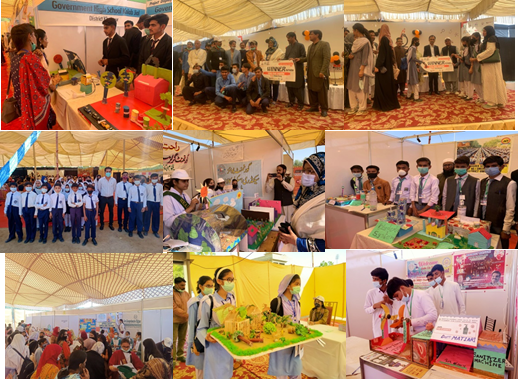1st Sindh Science Festival held at Karachi- Pakistan
Go Back

The first-ever two-day Sindh Science Festival was held at at the NED University of Engineering and Technology, Karachi- Pakistan on 10-11 February 2022. The Festival was organized by Thar Education Alliance (TEA), Sindh Education and Literacy Department in collaboration with ECOSF, NED University, JICA, Malala Fund and other national and international organizations.
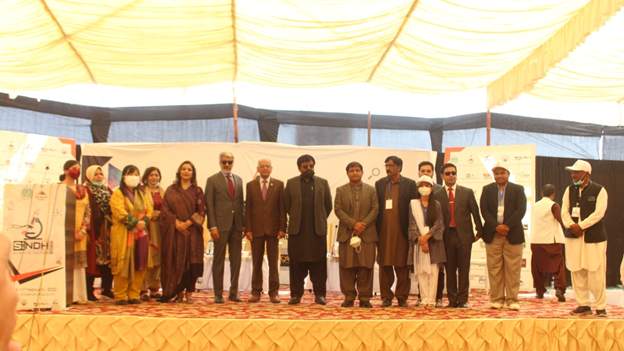
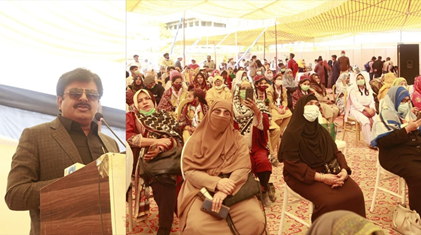 The Festival was opened by Education Minister of Sindh H.E. Syed Sardar Ali Shah. The Minister lauded the efforts of TEA and other organizers for organizing such kind of event in Karachi which provided an opportunity to the students from across Sindh province to learn more about science from the experts in panel discussions asnwell as from other students and teachers. He further said that “we could not go ahead without imparting modern science education and inculcating the habit of the experimenting things around in our kids”. Mr. Shah urged the students to get more interested in such subjects. He shared that a policy is being devised to introduce the process of licensing system for the teachers of the province, who after receiving proper training on teaching methodology, can be issued license to teach.
The Festival was opened by Education Minister of Sindh H.E. Syed Sardar Ali Shah. The Minister lauded the efforts of TEA and other organizers for organizing such kind of event in Karachi which provided an opportunity to the students from across Sindh province to learn more about science from the experts in panel discussions asnwell as from other students and teachers. He further said that “we could not go ahead without imparting modern science education and inculcating the habit of the experimenting things around in our kids”. Mr. Shah urged the students to get more interested in such subjects. He shared that a policy is being devised to introduce the process of licensing system for the teachers of the province, who after receiving proper training on teaching methodology, can be issued license to teach.
Prof. Manzoor Hussain Soomro, President ECOSF also spoke during the opening ceremony. In his speech, Prof. Soomro said that the nations who have invested in STEM education are far ahead in the development, thus, the STEM education is the key to prosperity and development. He further said that for achieving quality STEM education, there is a need of a better methodology to teach. Inquiry Based Science Education (IBSE) is one of the best methodologies to teach STEM in the world. Through IBSE, critical thinking and better decision making are developed among the pupils which leads to developing fine scientists in the country; thus, he urged to implement IBSE at all schools of the country to better understand and learn STEM. He also shared that ECOSF is promoting IBSE in ECO region including Pakistan and he offered ECOSF’s all possible support for capacity building of more teachers of Sindh. President ECOSF also visited the stalls set-up by the school students from across Sindh. He highly praised the efforts and talent of the participating students.
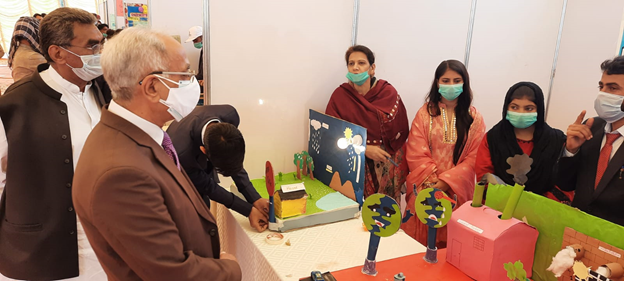
Different panel discussions on specific topics were also arranged throughout the two days. The panellists of various sessions during the festival stressed upon the high-ups of the Sindh government as well as on other organizations to extend their full support to the organizations working on the promotion of STEM education in all government and private schools of the province. They observed that without giving importance and top priority to the education of science and other related subjects, formal educational degrees would not help students achieve their ambitious goals adding they asked other organizations to organize such events in backward regions to provide opportunities to students to showcase their talent through their models and innovative activities. The panellists also emphasized on the high-ups of the Sindh government to open the science labs in all big and small schools with the required equipment.
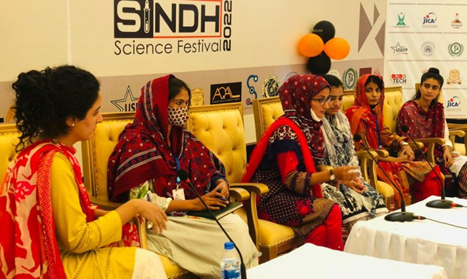 Mr Mosharraf Zaidi, the eminent writer, journalist and educationalist (formerly the CEO of Alif Ailan Education Campaign) during the panel discussion said that limiting the scope of education to mere few subjects was very detrimental to the mental growth of the students. Mr Zaidi observed that education could be used as a best tool to bring real change in society. He noted with concern that nations around the world had made great advancements and achieved various milestones in different fields; but the situation in Pakistan and many developing countries were still grim. He said that quality education could make a real difference and steer the people out of the current dismal situation.
Mr Mosharraf Zaidi, the eminent writer, journalist and educationalist (formerly the CEO of Alif Ailan Education Campaign) during the panel discussion said that limiting the scope of education to mere few subjects was very detrimental to the mental growth of the students. Mr Zaidi observed that education could be used as a best tool to bring real change in society. He noted with concern that nations around the world had made great advancements and achieved various milestones in different fields; but the situation in Pakistan and many developing countries were still grim. He said that quality education could make a real difference and steer the people out of the current dismal situation.
Ms Maleeha Khan, the Chief Programme Manager of Malala Fund during the panel discussion said that they were trying to improve the existing education system. She said that Malala Fund was giving special focus to the education of the girls and hoped that girls from the backward areas would get space during events and to shine themselves.
Ms. Khan highly praised the organizers for the two-day event and said that models prepared and exhibited by both girls and boys were wonderful. “Such students should be given more space and opportunities to showcase their talent and interest in such subjects,” she added.
Ms Huma Bukhari, co-chairperson of Newport Institute of Communication and Economics observed that it was the fundamental right of every student to get access to modern education adding she said that STEM education was key to in the current conditions. She highly lauded the efforts of the team of TEA and encouraged them to keep organizing such events.
Mr Yaqub Pechi, the Chairman of Thar Education Alliance said that they were trying to give opportunities to the students of remote and backward areas to shine at the national and international levels; adding he said that all that could not be possible without teamwork.
Ms Cheho Ohashi, Chief Advisor of Japan International Cooperation Agency (JICA) Pakistan stressed upon the quality of education with special attention to science education. She said that only trained teachers could help impart the quality of education. She said that her organization had been at the forefront in supporting the organization in such healthy activities and that they would be happy to support in future as well.
Adil Darvesh, Roshan Bukhari, Mukesh Nand, Iqbal Sheikh, Prem Sagir, Jibran Jamshed, Junaid Dahar and others also spoke during different sessions moderated by the people from different institutes.
Mr. Partab Shivani, the CEO of TEA speaking during the concluding sessions thanked all those, who fully cooperated and participated in different sessions of the festival adding he said that sole aim of the event was to provide equal space and opportunities to students from across the province, who according to him, added colours by establishing their stalls with unique science models.
More than 45 schools from 22 districts of Sindh setup their stalls and about 8000 people/students visited the Festival. The students through their scientific models tryied to find sustainable solutions to the challenges being faced by the people of Sindh and Pakistan. They displayed scientific models to address the issues such as water and environmental pollution, power generation from alternative sources, traffic and urban development issues, and the handling of humanitarian issues.
At the end, the medals and appreciation certificates were distributed among the participating students/schools.
Following are some glimpses of the Festival:
